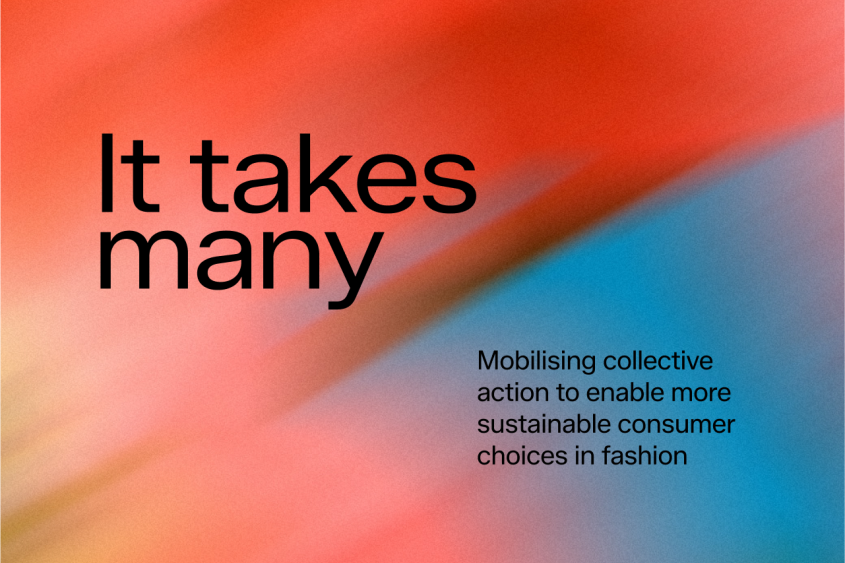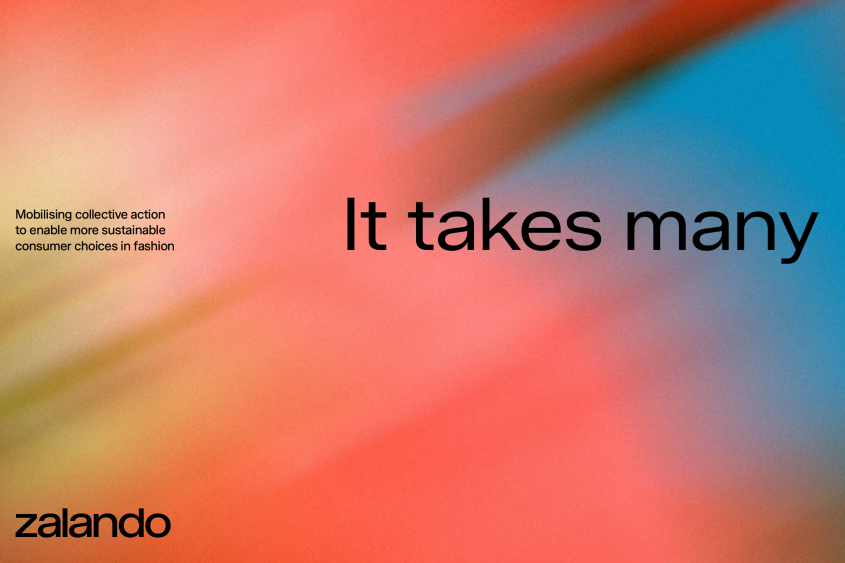With a new sustainability behaviour report, Zalando calls for collective action
With a new sustainability behaviour report, Zalando calls for collective action

A new study with consumers, titled ‘It takes many,’ presents a collective roadmap for change with recommendations for retailers and brands, the EU, and other national governments, as well as social media platforms and influencers.
Berlin, June 3, 2025. Four years after our first sustainability attitude-behaviour gap report, ‘It takes two,’ we are publishing an updated study, titled ‘It takes many - Mobilising collective action to enable more sustainable consumer choices in fashion.’ The study builds on the learnings from the previous report and ventures into what consumers expect from other industry players and the potential for impact across the fashion ecosystem.
The study finds that although consumers want to take next steps in making more sustainable fashion choices, there is a persistent attitude–behaviour gap as many still seem to struggle to act on their intentions. Most importantly, the research confirms that consumers view sustainability as a shared responsibility and expect action from brands, fellow consumers, governments, non-governmental organisations, influencers, and digital platforms. As a concrete outcome of the study, we have introduced an initial roadmap for collective action, shaped through dialogue with consumers and leading industry experts.
The report is based on quantitative and qualitative research conducted across France, Germany, Italy, Sweden, and the UK to assess general consumer attitudes, behaviours and expectations regarding fashion and sustainability. The findings were enriched with interviews from industry experts – including Zalando’s partner brands, associations, consultancies, and independent specialists – to explore how various actors can better enable more sustainable choices and support a broader industry transformation. The study was conducted in partnership with GlobeScan, an insights and advisory firm specialising in trust, sustainability, and engagement.

It takes many - Attitude Behaviour Gap Report 2025
(pdf, 2.74 MB)
A multi-faceted approach to the challenges of more sustainable fashion
The report’s key findings are grouped into three categories that reflect the complexity of sustainability in fashion: 1. Beyond the gap; 2. It takes many; 3. What’s next with consumers.
1. Beyond the gap
- 66% of consumers say they already make sustainable choices and 62% report having “a lot” to a “moderate” amount of knowledge about sustainability.
- But consumers want to do more than they are doing today – 71% aspire to shop for fashion items more sustainably and 74% want to wear clothes more sustainably.
- Key barriers stand in the way of consumers realising their aspirations: price (41%), difficulty identifying sustainable options (27%), not knowing where to shop (24%), not knowing what to do (21%), and distrust in sustainability claims (19%).
2. It takes many
Consumers see more sustainable fashion as a shared responsibility.
- 77% expect action from brands and 72% from individuals like themselves.
- Many also look to the EU (66%), social media platforms (65%), national governments (63%), and influencers (61%) to take responsibility for more sustainability in the fashion industry.
- Stakeholders are expected to make sustainability the norm: brands and retailers must lead the way, governments and the EU should support through policy and infrastructure, and social media platforms and influencers need to help shift consumer mindsets away from fast fashion.
3. What’s next with consumers
Consumers are diverse. Our segmentation identifies four groups among the consumers we interviewed – Fashion First, Conscious Curators, Mindful Minimalists, and Indifferents – that can be more effectively engaged through a deeper understanding of their motivations and challenges. Their motivations range from value-seeking and self-expression to sustainability and minimalism.
To enable real change, the fashion industry must meet consumers where they are, not where we assume or wish them to be.
Roadmap for collective change
As a concrete outcome of the study, we have introduced an initial roadmap for collective action, shaped through dialogue with consumers and leading industry experts.
Brands and retailers are urged to make more sustainable fashion the default choice by investing in product design, material innovation, and affordability. Only if supported - and not hindered - by clear and enabling regulation, can brands and retailers accompany these actions with greater transparency and provide accessible, trustworthy information that supports consumers throughout their purchasing journeys. Support must also extend beyond the point of sale, enabling customers to care for, repair, and recycle garments as well as making second-hand shopping a seamless part of the mainstream retail experience.
The roadmap for collective action in the industry also calls on governments and the EU to create the conditions to enable more sustainable behaviour in consumers by lowering taxes on sustainable products, funding infrastructure for circularity, and simplifying labelling to make sustainable choices easier to identify. According to the study, a third of consumers who look to governments and the EU for help support a simplified, government-backed label or eco-score system to help them navigate sustainability claims with more confidence. Finally, social media platforms and influencers are expected to use their influence to shift the narrative away from fast fashion and toward a more aspirational vision of durability, quality, and conscious consumption.
Bridging the gap between consumers’ intentions and actions requires aligned efforts from all stakeholders in the entire fashion ecosystem. It takes many.
What are we doing to enable change? Read more about our sustainability initiatives in this article on our People & Planet blog.
Zalando SE Boiler Plate EN
About Zalando
Founded in Berlin in 2008, Zalando is Europe’s leading online multi-brand fashion destination. We are building a pan-European ecosystem for fashion and lifestyle e-commerce, along two growth vectors: Business-to-Consumer (B2C) and Business-to-Business (B2B). In B2C, our two brands Zalando and ABOUT YOU, provide an inspiring, high-quality multi-brand shopping experience for fashion and lifestyle products, reaching more than 61 million active customers across 29 markets. In B2B, we offer a unique e-commerce operating system with ZEOS, Tradebyte and SCAYLE, leveraging our logistics infrastructure, software, and service capabilities to support brands and retailers in managing and scaling their entire e-commerce business across Europe.
For further information, please visit: corporate.zalando.com/en
Contact Corporate Communications
Corporate Communications
press@zalando.com
